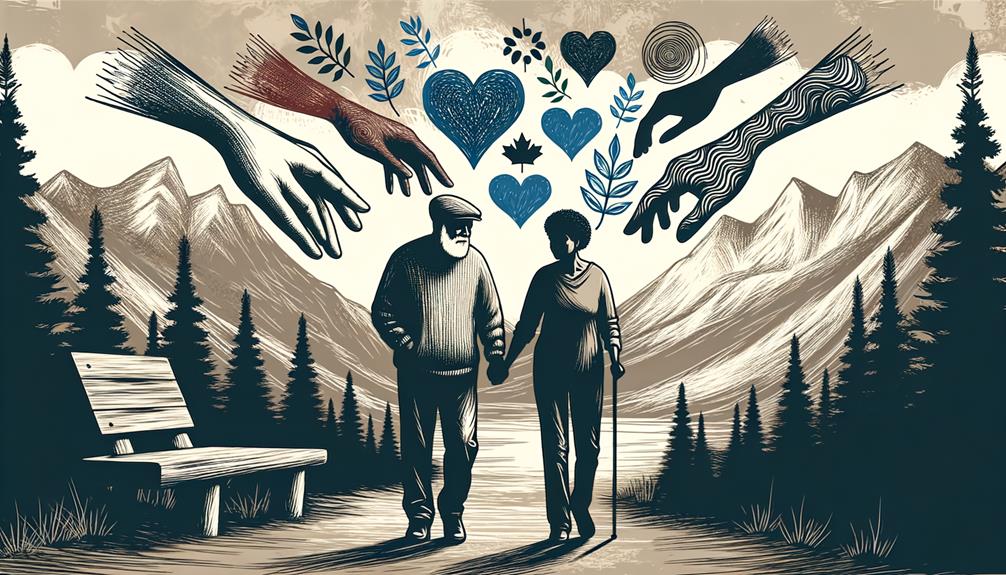For Canadian seniors seeking mental health support, there are many resources available to them. Government programs offer customized support for issues like isolation, depression, and anxiety, focusing on prevention and treatment. Crisis Services Canada provides 24/7 assistance via chat, text, and phone (1.833.456.4566). Online platforms like eMentalHealth.ca offer therapy and screening tools. Seniors can access certified counselors both in-person and online. Caregivers also have specialized resources for education and mental health support. For Indigenous seniors, culturally sensitive counseling and traditional healing practices are available. These options can help improve mental well-being, and there are many more valuable resources available to explore.
Government Programs
Canada's government programs offer tailored mental health support specifically designed to address the unique needs of seniors. Recognizing that aging can lead to various mental health concerns, such as isolation, depression, and anxiety, these initiatives aim to promote mental health and wellness among older Canadians.
Through these programs, seniors can access reliable information and customized support to manage their mental well-being. The Government of Canada provides educational resources that empower seniors to take proactive care of their mental health. These initiatives focus not only on treatment but also on prevention, encouraging older adults to engage in activities that promote mental wellness.
Moreover, these programs are inclusive, ensuring that all seniors, regardless of their background, can benefit from the support provided. By offering a range of services, from counseling to community engagement activities, the government's efforts aim to foster a sense of belonging and resilience among seniors.
Crisis Support Lines

While government programs provide long-term support, immediate assistance during a mental health crisis is just as vital for seniors. Seniors' mental health is a pressing issue, and having access to reliable crisis support lines can make a significant difference. Crisis Services Canada offers a lifeline for those in distress or contemplating suicide, providing access to local distress centers through various communication methods, including chat, text, and phone.
You can reach Crisis Services Canada 24/7 by calling their toll-free number, 1.833.456.4566, ensuring that help is always available when needed. For situations involving immediate danger or requiring urgent medical support, dialing 9-1-1 remains the best course of action. Additionally, for suicide crisis help, texting or calling 9-8-8 offers another critical resource.
It's also important to remember that crisis lines are available for family or gender-based violence, providing further support and assistance customized to specific needs. By promoting these resources, we ensure that seniors know they are not alone and have access to the necessary tools for immediate help. Addressing mental health crises promptly can save lives and foster a stronger, more supportive community.
Online Mental Health Portals

Online mental health portals can greatly benefit Canadian seniors. These platforms offer accessible therapy options, supportive community forums, and a wealth of educational resources on mental health. By utilizing these digital tools, we can ensure that seniors receive the support and information they need.
Accessible Therapy Platforms
Exploring online mental health resources like eMentalHealth.ca can greatly benefit Canadian seniors, providing them with access to a wide range of tools and services that support their mental well-being. These platforms offer a comprehensive directory of mental health services, making it easier for seniors to find the support they need. By providing online access, these portals ensure that help is always within reach.
We can search for therapists based on their specialization, the conditions they treat, or the type of therapy they offer, allowing us to find the best fit for our needs. This personalized approach ensures that seniors receive customized support, whether it's through in-person sessions, online counseling, or tele-counseling services. The availability of free screening tools also helps identify potential mental health issues early, enabling timely intervention.
Online mental health portals like eMentalHealth.ca play a vital role in raising awareness about mental health conditions. They offer a wealth of information and tools to address various concerns, making them invaluable resources for anyone seeking mental health support. By increasing accessibility and awareness, these platforms greatly contribute to the mental well-being of Canadian seniors, ensuring they have the resources they need to thrive.
Supportive Community Forums
In addition to therapy platforms, online mental health portals like eMentalHealth.ca provide Canadian seniors with a space to connect, share experiences, and access valuable resources tailored to their mental health needs. These forums play a vital role in promoting mental health awareness and offering practical resources specifically designed for seniors.
eMentalHealth.ca offers directories of services, online screening tools, and information sheets on various mental health conditions. Seniors can use these platforms to connect with certified counselors and psychotherapists, search by specialization areas, and find local mental health support. This connectivity fosters a sense of community, reducing feelings of isolation and empowering seniors to take proactive steps in managing their mental health.
The Canadian Coalition for Seniors and the Mental Health Association contribute valuable insights and resources to these forums. Their involvement ensures that the information shared is credible, evidence-based, and geared towards the unique challenges faced by Canadian seniors. By leveraging these supportive community forums, we can help seniors navigate their mental health journeys more effectively and compassionately, ensuring they have the support and resources they need to thrive.
Educational Mental Health Resources
Online mental health resources like eMentalHealth.ca offer a wealth of information and tools to help Canadian seniors manage their mental well-being. This platform provides a comprehensive directory of mental health services and organizations across Canada, making it an invaluable resource for older adults seeking support.
The portal features free online screening tools, allowing seniors to assess their mental health privately and accurately. The site also offers informative fact sheets on various mental health conditions, providing users with clear and reliable information. These resources empower older adults to understand their mental health concerns and make informed decisions about seeking further assistance.
Counseling Services

To address the mental health needs of Canadian seniors, the Canadian Counseling and Psychotherapy Association (CCPA) offers certified counselors and psychotherapists who provide both in-person and online services tailored to meet the unique challenges faced by seniors. This personalized approach ensures they receive the support they need in a convenient and accessible manner.
Seniors and their caregivers can easily search for counselors by specialization area or specific conditions through the CCPA website, making it easier to find the right fit for their mental health needs. This targeted approach helps address issues such as depression, anxiety, and grief, which are common among older adults. Additionally, eMentalHealth.ca provides a detailed directory of mental health services and organizations specifically for seniors, facilitating access to resources and support networks.
Support for Caregivers

Acknowledging the vital role caregivers play, it's crucial we provide them with the necessary resources and support to manage the mental health challenges they face. Caregivers of older adults often experience heightened levels of stress, anxiety, and depression, which can lead to caregiver burnout. This not only affects their own mental health but also impacts the quality of care they provide.
To address these challenges, a range of support resources are available:
| Resource Type | Description | Benefits |
|---|---|---|
| Respite Care | Temporary relief for caregivers | Reduces stress and prevents burnout |
| Support Groups | Regular meetings with fellow caregivers | Offers emotional support and advice |
| Counseling Services | Professional mental health counseling | Addresses anxiety, depression, and stress |
| Online Forums | Digital platforms for sharing experiences | Provides a sense of community and practical tips |
Substance Use Resources

Recognizing the complexities caregivers face, it's crucial to address the substance use resources available to support the mental and physical well-being of older adults. Substance use, including alcohol and cannabis, can have a significant impact on mental health and substance-related issues among seniors. To provide thorough care, we need to offer targeted resources and practical tools.
These resources include:
- Brochures and educational materials that help older adults understand responsible cannabis use and its effects.
- Informational campaigns that raise awareness about safe alcohol consumption, tailored to seniors.
- Guides that assist caregivers in responding to behaviors influenced by dementia, which may be worsened by substance use.
- Programs that promote healthy lifestyles to mitigate substance use issues.
- Resources that empower older adults and their care partners to make informed decisions about substance use.
Indigenous Mental Health Support

When it comes to supporting Indigenous mental health, culturally sensitive counseling services and traditional healing practices must be prioritized. Recognizing the significance of cultural identity and historical context is crucial in promoting mental well-being. Services like the Hope for Wellness Help Line and the National Indian Residential School Crisis Line play a vital role in ensuring comprehensive care.
Culturally Sensitive Counseling Services
In addressing the unique mental health needs of Indigenous seniors, culturally sensitive counseling services play a vital role in providing effective and respectful support. These services recognize the importance of cultural context and work to customize mental health support for Indigenous individuals across Canada.
Several key resources offer culturally customized assistance:
The Hope for Wellness Help Line provides emotional support specifically for First Nations, Inuit, and Métis Peoples. The National Indian Residential School Crisis Line offers specialized mental health assistance for Indigenous individuals affected by the residential school system. The Missing and Murdered Indigenous Women and Girls Crisis Line delivers support personalized to the needs of Indigenous communities, particularly women and girls. Culturally appropriate services are designed to respect and incorporate Indigenous cultural practices and beliefs. These resources are often available 24/7, ensuring that help is accessible whenever it's needed.
Traditional Healing Practices
Embracing traditional healing practices can greatly enhance the mental health support available to Indigenous seniors across Canada. These practices focus on holistic approaches that incorporate spiritual, emotional, physical, and mental well-being, making them uniquely suited to address the complex needs of Indigenous seniors.
Traditional healing practices, such as ceremonies, storytelling, sweat lodges, smudging, and connection to the land, are deeply rooted in Indigenous cultures and offer a sense of belonging and continuity. Elders and knowledge keepers play a pivotal role in guiding these practices, ensuring that wisdom and cultural teachings are passed down to support mental health.
We must recognize the importance of culturally sensitive and community-based mental health services. These services are not only beneficial but essential in addressing the unique needs of Indigenous seniors. By integrating traditional healing practices, we can create a more inclusive and effective mental health support system.
| Traditional Healing Practices | Benefits for Mental Health |
|---|---|
| Ceremonies | Spiritual and emotional connection, community bonding |
| Storytelling | Cultural continuity, emotional expression, and understanding |
| Sweat Lodges | Physical purification, mental clarity, and spiritual renewal |
Incorporating these traditional healing practices into mental health support systems for Indigenous seniors can foster resilience, well-being, and a stronger sense of community.
Frequently Asked Questions
Does Canada Offer Free Mental Health Care?
Canada offers free mental health care through various government-funded programs and community organizations, ensuring support for those in need. For instance, we can access services like Wellness Together Canada and the Canadian Mental Health Association.
How to Help a Senior With Mental Health Issues?
When dealing with seniors who struggle with mental health issues, it's essential to approach the situation with empathy and understanding. One effective way to start the conversation is by gently pointing out the changes you've observed in their behavior or mood. Be patient and create opportunities for them to open up, ensuring they feel supported throughout the process. If needed, suggest seeking professional help from resources like support lines, which can provide additional guidance and assistance.
What Are the Senior Assistance Programs in Canada?
Isn't it surprising that despite our advanced society, only a small percentage of seniors access mental health services? We need to prioritize programs like the Canada Pension Plan, Old Age Security, and community-based mental health initiatives to better support them.
What Is the Mental Health of Senior Citizens in Canada?
Many Canadian seniors face significant mental health challenges, including depression and social isolation. Unfortunately, very few seek mental health services, highlighting a critical need for increased awareness and accessible support systems.



